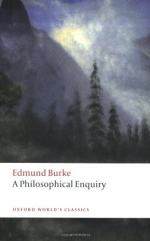
|
| Name: _________________________ | Period: ___________________ |
This test consists of 15 multiple choice questions and 5 short answer questions.
Multiple Choice Questions
1. What passion does Burke identify as most effectively robing the mind of reasoning?
(a) Disgust.
(b) Anger.
(c) Love.
(d) Fear.
2. How, according to Burke, can light and dark be equal?
(a) Because according to science, there is no difference between light and dark.
(b) If one experiences light and dark for equal periods of time.
(c) When the overpowering nature of one creates the effect of the other.
(d) Only when quantities balance each other.
3. In Burke's opinion, at what depiction do painters most notably fail?
(a) The depiction of the sea.
(b) The depiction of nobility.
(c) The depiction of lovers.
(d) The depiction of hell.
4. What two aspects comprise Burke's "artificial infinity?"
(a) Succession and uniformity.
(b) Strength and power.
(c) Curiosity and desire.
(d) Terror and greatness.
5. How does Burke define sympathy?
(a) As a sort of emotional substitution between people or through art.
(b) As a desirable state of mind reached by looking inward towards one's own soul.
(c) As an unnecessary show of weakness that will cause pain.
(d) As a painful realization, and reasoned acceptance, of one's humanity .
6. How does Burke define solitude?
(a) As a pleasurable enjoyment.
(b) As a positive pain.
(c) As a necessary evil.
(d) As a welcome release.
7. According to Burke, what is more powerful than light at representing the sublime?
(a) Fire.
(b) Darkness.
(c) Humanity.
(d) Water.
8. What examples does Burke use to argue that some sights are pleasurable to all people?
(a) Objects or ideas that he argues are morally repugnant.
(b) Objects he and others he knows think are beautiful.
(c) Objects he says can only be found in country estates.
(d) Objects he opines are among the ugliest animal species.
9. What does Burke warn his readers about in the Second Preface?
(a) His book will challenge their core values.
(b) His book may be construed as unpatriotic.
(c) His book will contain faults.
(d) His book may make them angry.
10. How does Burke define "grief?"
(a) As the most desirable of the sensibilities because it is strong.
(b) As one of many types of positive pain.
(c) As the natural state of relationships between all people.
(d) As that feeling when an object is so lost that one can never enjoy it again.
11. Why are certain drugs enjoyable, according to Burke?
(a) Because people can get them for a low cost.
(b) Because people become accustomed to their pleasurable effects.
(c) Because the users only take them for their healthy properties.
(d) Because the users have no idea of the potential harm of the drug.
12. What example does Burke give for a sublime sound?
(a) Childish laughter.
(b) Lapping waves.
(c) Artillery booming.
(d) Running water.
13. What example does Burke offer to show his ideas on the effects of tragedy?
(a) A mother and father losing their infant to an early death.
(b) A mass-murderer terrorizing the city.
(c) London being destroyed by an earthquake.
(d) The shocking regicide of the monarch.
14. How do smells and tastes become sublime most effectively?
(a) When moderated through narrative and description.
(b) When combined with eating and drinking.
(c) When mediated through art.
(d) When they occur when one is in a dreaming state.
15. What is Burke's argument for the existence of the passion of ambition?
(a) Ambition incites in people the drive to improve and excel so society will not stagnate.
(b) Ambition is the manifestation of the natural hierarchy of low humans to high humans.
(c) Ambition forces people to look within and question their inner selves.
(d) Ambition incites jealousy and envy, which drive people to become violent.
Short Answer Questions
1. When might the sublime be delightful?
2. Why, according to Burke, is the idea of God sublime?
3. To what effect does Burke use the example of the Turkish emperor?
4. Why is grief a part of pleasure, according to Burke?
5. What will be Burke's focus in "A Philosophical Enquiry Into the Origin of Our Ideas of the Sublime and Beautiful"?
|
This section contains 764 words (approx. 3 pages at 300 words per page) |

|




